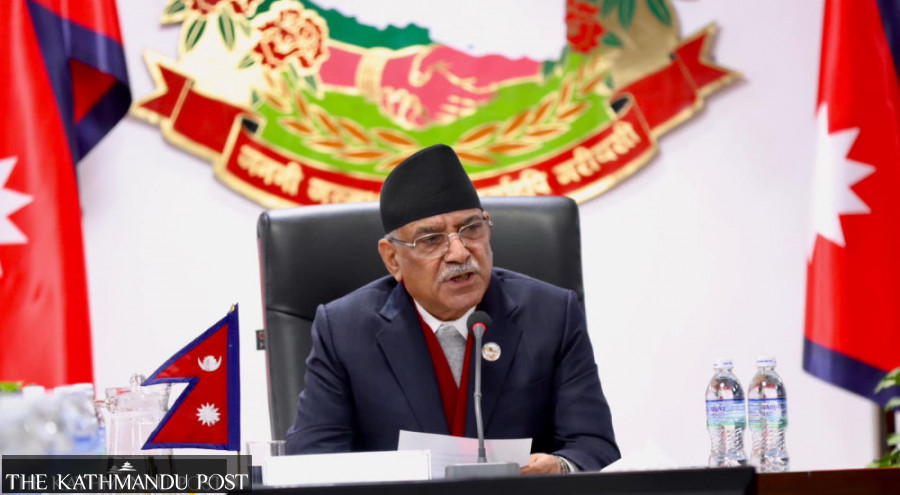National
Legal doubts over Constitutional Council meeting
The law appears to be unclear on whether the council has the mandate to make decisions.
Tika R Pradhan
Prime Minister Pushpa Kamal Dahal has called a meeting of the Constitutional Council for Friday after consulting KP Oli, the leader of the main opposition CPN-UML, as well as Sher Bahadur Deuba, the leader of the largest parliamentary party Nepali Congress.
The prime minister’s office itself has blamed the delay in constitutional appointments on a lack of necessary laws, and a bill to amend the Constitutional Council Act (2010) is currently in Parliament.
It appears the law is unclear on whether the council can make any decision.
Responding to advocate Kapil Dev Dhakal, who had reminded the Constitutional Council of its duty to appoint the chief justice, the prime minister’s office on March 1 stated that there is currently a legal vacuum and the council can’t make appointments as sub-clauses 6 and 7 of clause 6 of the Constitutional Council Act 2010 were scrapped and sub-clauses 3 and 5 were amended through an ordinance—and the amendment has been rendered null and void after it the Parliament failed to pass it.
The prime minister’s office also clarified in response that a bill to amend the Act is currently under consideration of the House of Representatives.
“Therefore the process of appointing the chief justice could not be taken forward,” the written response by the prime minister’s office to Dhakal stated.
The response showed that the government believes that new constitutional appointments are not possible unless the amendment bill is endorsed by Parliament.
Against this backdrop, the prime minister has called the meeting of the Constitutional Council at 9 am on Friday, but he too seems unclear about the legal standing of its meeting.
“The council cannot make any decision if it does not have a legal standing,” said advocate Bhimarjun Acharya, a constitutional expert.
Although some legal experts claimed that the previous provisions of the Constitutional Council Act will be automatically revived if the ordinance brought to amend them is either repealed or expires, the KP Sharma Oli-led government had set a trend of reviving such legal provisions only through Parliament.
As the changed provisions of the Constitutional Council Act (2010) have not been revived through Parliament even after the expiry of the ordinance, the government seems to believe there is a legal vacuum and the council cannot make any decision.
But, on Monday, three top leaders—Prime Minister and Maoist Centre chair Dahal, Nepali Congress President Deuba, and leader of the main opposition UML chair Oli—met and agreed to call a meeting of the Constitutional Council to proceed with the appointment of a new chief justice.
“We can convene the meeting of the Constitutional Council even on the basis of the constitution that imagines a six-member council,” said Mahesh Bartaula, the UML whip. “As we, the main opposition, have no issue with it, there should be no room for confusion.”
But constitutional expert Acharya disagrees.
“In principle, the original law [and its provisions] automatically springs back to effect once the ordinance becomes ineffective,” Constitutional expert Acharya told the Post. “But the previous Oli government had started the practice of reviving the provisions through Parliament, thus creating confusion.”
Echoing UML chief whip Bartaula, former justice of the Supreme Court Balaram KC said the meeting could also be held based on the constitutional provision that six council members can make decisions.
“One option for the prime minister would be to call the meeting of the council by appointing a law minister, as a measure to remove the difficulties as prescribed in the constitution,” said KC.
On Tuesday evening President Ramchandra Paudel allocated the portfolio of the Minister for Law, Justice and Parliamentary Affairs to Purna Bahadur Khadka, who is deputy prime minister and a defence minister.
But KC also said there cannot be a legal vacuum even after the expiry of the ordinance and it is for Parliament, and not the executive, to decide what to do with the laws.
“I think the government should come up with a clarification in this case so that the public understands how the government actually wants to resolve this issue,” KC told the Post.
KC said any Nepali citizen has the right to knock on the court’s door to challenge the government's decisions but this issue may not get much attention as it is related to the appointment of the judiciary's head.
Former Justice KC also said the problem is with the constitutional provision that the Constitutional Council, rather than the Judicial Council, nominates the chief justice. “If the judicial council could nominate the chief justice, there wouldn’t be any such issues,” KC said.




 13.12°C Kathmandu
13.12°C Kathmandu














